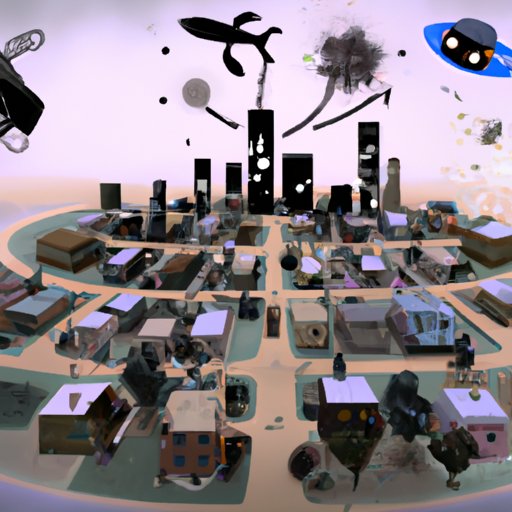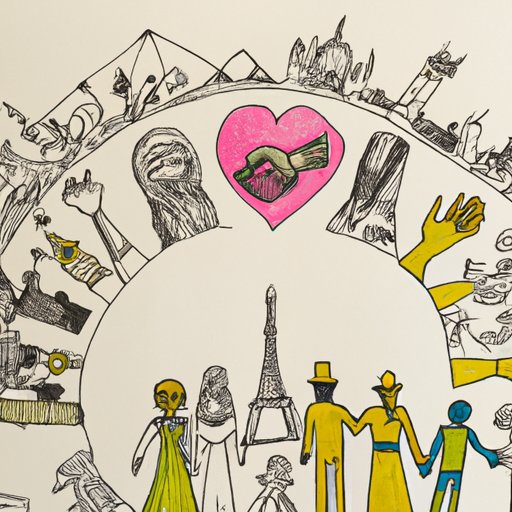Introduction
The concept of an “imagined community” has been gaining traction in recent years, as people have become increasingly aware of its implications. In essence, an imagined community is a group of people who have a shared identity or culture, even though they may not actually know each other or be geographically close to one another. This type of community can be formed by a variety of factors, such as shared interests, beliefs, values, or goals.
While imagined communities have existed throughout history, the concept has gained greater prominence in recent years due to advances in technology and communication. With the rise of social media, it has become easier than ever for people to connect with one another, regardless of their physical location. As a result, these virtual communities have become increasingly influential in shaping our identities and worldviews.
Historical Overview of Imagined Communities
The term “imagined community” was first coined by Benedict Anderson in his 1983 book Imagined Communities: Reflections on the Origin and Spread of Nationalism. Anderson argued that nations are “imagined” because they are constructed through shared ideas and beliefs, rather than being based on actual physical interactions between people. He posited that nationalism is based on a collective “imagining” of a nation and its people, which allows individuals to feel connected to one another despite their geographical distance.
Since Anderson’s work, scholars have explored the concept of imagined communities in depth. For example, anthropologist Arjun Appadurai has argued that imagined communities are essential for understanding global culture, as they provide a way for people to connect with one another across national boundaries. Similarly, sociologist Michael Mann has suggested that imagined communities are important for creating solidarity among people and providing them with a sense of belonging.

Exploring the Phenomenon of Imagined Communities
Imagined communities come in many forms and can be created for various purposes. Some examples include online communities, fan clubs, and social movements. These types of communities often form around shared interests, values, or goals, and can be used to bring people together to achieve a common purpose.
One of the primary reasons for the popularity of imagined communities is their ability to provide an escape from everyday life. According to researcher Elizabeth Reid, “Imagined communities give people a chance to escape the mundane and ordinary aspects of life and enter into a world of possibility and adventure.” By joining an imagined community, individuals can find solace in a safe space where they can explore new ideas, express themselves freely, and make meaningful connections with others.
Examining the Impact of Imagined Communities on Society
Imagined communities have had a profound impact on society, particularly in terms of creating social connections. Studies show that participation in online communities can lead to increased feelings of connectedness and belonging. For example, a study conducted by researchers at the University of California found that participation in online communities led to higher levels of self-esteem and social support.
In addition to creating social connections, imagined communities can also have a significant cultural impact. Many online communities are devoted to specific topics or interests, such as music, art, or literature. These kinds of communities can create an environment where people can share their knowledge, express their creativity, and discuss issues that matter to them. As a result, these communities can have a powerful effect on how we think about and engage with culture.

Investigating the Power of Imagined Communities
Imagined communities also have the potential to wield considerable political and economic power. For example, some online communities have successfully organized protests or campaigns to advocate for social change. Additionally, some communities have been able to use their collective buying power to influence corporations or politicians.
In addition, imagined communities can have a positive economic impact. By connecting people with similar interests, these communities can create valuable networks of buyers and sellers. This can lead to increased productivity, job creation, and economic growth.

Exploring the Role of Imagined Communities in Social Change
Imagined communities can play an important role in promoting positive social change. For example, online communities have been instrumental in raising awareness about important social issues, such as human rights violations and environmental degradation. In addition, these communities can provide a platform for people to share their stories and experiences, which can help to build empathy and understanding among members of different groups.
However, there are also potential barriers to using imagined communities to promote social change. For example, these communities can be vulnerable to manipulation by outside forces, such as governments or corporations. Additionally, some people may be hesitant to join an online community out of fear of judgment or ridicule. As a result, it is important for individuals to be mindful of the potential risks associated with participating in imagined communities.
Conclusion
Imagined communities have become increasingly popular in recent years, as they offer people a way to connect with one another and explore new ideas. These communities come in many forms and can be used to create social connections, foster cultural exchange, and promote positive social change. They also have the potential to wield considerable political and economic power. Ultimately, understanding the dynamics of imagined communities is key to understanding their role in society.
In conclusion, imagined communities are an important phenomenon that have far-reaching implications for society. It is important to recognize their potential and to take steps to ensure that they are used in a positive and ethical manner. By doing so, we can ensure that these communities continue to be a force for good in the world.
(Note: Is this article not meeting your expectations? Do you have knowledge or insights to share? Unlock new opportunities and expand your reach by joining our authors team. Click Registration to join us and share your expertise with our readers.)
